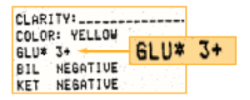$1.75 Million for Detective's Death from Misdiagnosis of Diabetic Emergency
 John Doe was an active and ambitious 42-year-old detective who was devoted to his wife and three sons, his brothers and his insulin dependent mother.
John Doe was an active and ambitious 42-year-old detective who was devoted to his wife and three sons, his brothers and his insulin dependent mother.
According to his family doctor, Detective Doe's only medical concern was that his blood sugar was "borderline high," but he was "not yet diabetic." Detective Doe exercised and watched his weight as instructed and his blood sugar declined.
When Detective Doe began experiencing frequent urination and a dry mouth, he called to schedule an appointment with his doctor. The appointment on January 7, 2002, was described as "follow-up DM" (diabetes mellitis).
The doctor appropriately ordered a dipstick urinalysis which showed an abnormal 3+ reading for glucose, indicating blood sugars much higher than any Detective Doe had ever had before. Inexplicably, the doctor ordered no follow-up testing or treatment for diabetes, but instead diagnosed prostate infection and prescribed an antibiotic.
When Detective Doe's condition continued to deteriorate, he called back on the morning of January 10, 2002 and asked to talk to the doctor. Despite new symptoms including vomiting, diarrhea, headaches, weakness and inability to eat, the doctor did nothing but instruct his nurse to call back with a different antibiotic prescription.
By the next morning Detective Doe was so disoriented that it was his wife who had to call. She would not accept the doctor's relayed instructions to continue the medication, but insisted on a return call. By the time that call came, Mrs. Doe had already started for the emergency room.
It was too late. Even though the emergency room took Detective Doe straight back, his blood sugar had been high for too long, and he was difficult to arouse. Any blood sugar over 500 can be life-threatening and his was over 2,500 on arrival. Detective Doe lapsed into a nonketotic hyperosmolar diabetic coma and died within a few days.
Detective Doe's care is typical of the superficial treatment too many patients now receive under managed care with its disincentives for adequate testing and timely referrals. For those reasons Pajcic & Pajcic sued not just the doctor, but also his affiliated hospital and HMO.
The case settled at an early mediation for $1,750,000. The settlement sets substantial money aside for the education of all three sons and will allow Mrs. Doe to continue as a full-time mother and homemaker.
